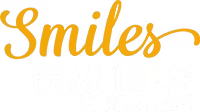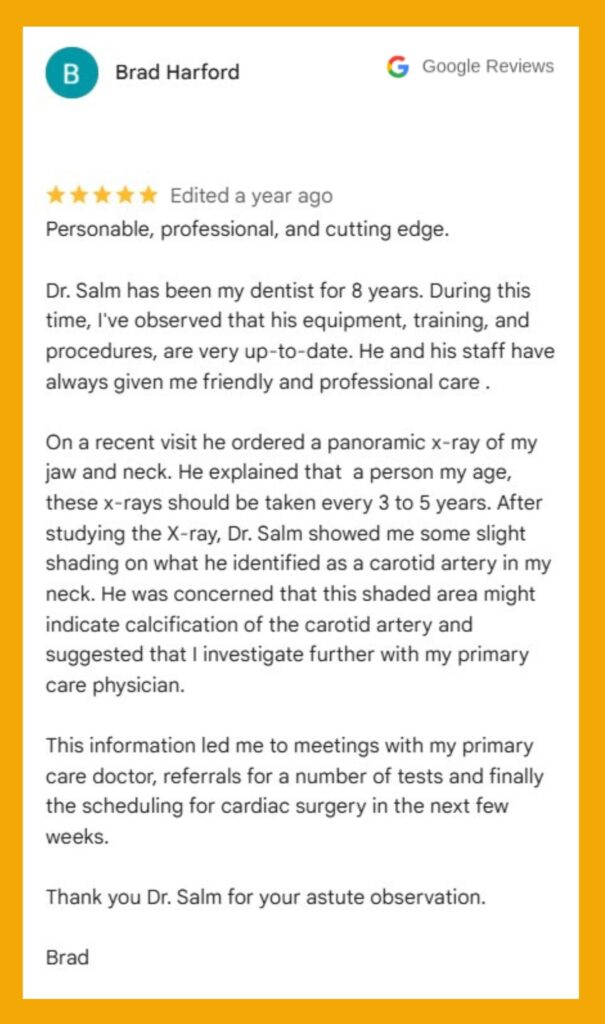Do you want to avoid painful tooth infections, debilitating gingivitis, and even embarrassing tooth loss? Cavities, gum disease, and worn enamel can cause pain, expensive treatment, and daily stress.
At Smiles for Miles Dentistry, our goal is to help patients prevent dental issues before they start. With proactive care and patient education through preventive dentistry, Dr. Richard Salm and our experienced team empower you to protect your oral health for life.
Preventive dentistry minimizes the need for costly or complex treatments in the future, saving you time and money!
Satisfied Patient Reviews:
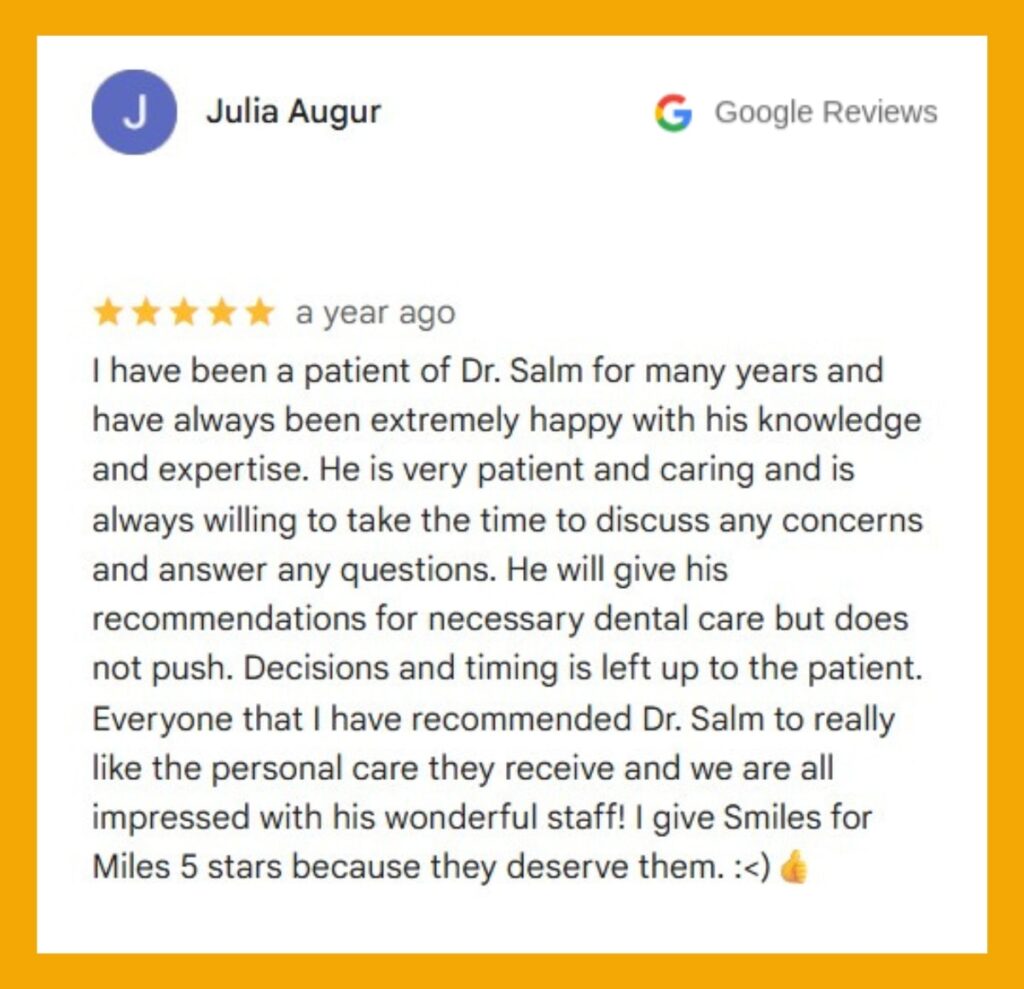
Too many people wait until something hurts before they call a dentist. But preventive dentistry gives you a better way to care for your smile and stop problems early.
After all, healthy teeth do a lot more than brighten your smile. They help you eat, speak, and even live without pain. But small dental problems grow fast when you ignore them.
Smiles for Miles Family Dentistry proudly serves patients from Brookfield, Waukesha, Elm Grove, Butler, Pewaukee, and nearby areas. Patients return year after year because they trust our gentle, honest, and effective care.
Why Preventive Dentistry Matters
Preventive dental care matters at every age. You maintain a healthy mouth by partnering with your dentist. Strong oral health grows from steady habits.
Plus, timely dental visits protect your teeth over time.
An Established Dental Plan Supports Preventive Care
Dr. Salm creates a preventive dental plan specifically for you so it’s easier to establish a routine for maintaining good oral health.
This plan may include:
- Setting up appointments for exams and teeth cleanings
- Scheduling preventive treatments like fluoride or dental sealants for teens and children
- Oral cancer screening
- Tips for maintaining healthy gums and preventing gum disease
Build good oral hygiene habits and keep regular dental visits to improve your oral health. Working closely with your dentist encompasses a big part of that approach.
Routine Dental Visits Prevent Tooth Decay
Even patients with strong at-home routines can develop dental issues. These problems often go unnoticed without expert evaluation. That’s what makes routine visits to our office so important.
With more than 19 years of experience, Dr. Salm’s training lets him recognize subtle signs of tooth decay. These signals can include weakened enamel, early dental caries, and areas where dental plaque has started to accumulate.
Early Detection Tools Protect Your Oral Health
Using home tools like a toothbrush and dental floss establishes good oral health habits. However, many issues remain hidden without professional evaluation.
During your visit, Dr. Salm uses advanced diagnostic technology to catch problems early, including:
- Tiny cavities that are too small to see or feel at home
- Weakened tooth enamel that may be starting to erode
- Early-stage gum disease developing below the gumline
Digital X-rays and advanced dental imaging help us find these issues early.
Detecting issues early allows for simpler, more affordable treatment. It also helps protect your long-term oral health.
A Continuum of Care from Dental Fillings to Extractions
Follow-up treatments stop issues found during exams from progressing. They reduce the need for more invasive or costly procedures later.
Dental fillings, extractions, and periodontal disease treatment do not fall under preventive dentistry.
But Dr. Salm often recommends a follow-up appointment to treat any problems found during your time in the dental chair.

Preventive Dental Services We Offer to Prevent Cavities
Smiles for Miles Dentistry offers a variety of preventive dental care services to our patients.
Teeth Cleanings and Regular Dental Checkups
You can still develop tooth decay even when you’re brushing your teeth regularly. Decay spreads into deeper layers of the tooth as it worsens.
That leads to pain, infection, and even tooth loss if left untreated.
Preventive dental care reduces these risks by helping you avoid cavities, enamel wear, gum disease, and other common oral health problems.
Natural Smile Protection
Dentists focus on preserving your natural teeth whenever possible. So, catching issues early makes treatment simpler and more effective.
During dental visits, you should mention any changes that don’t look or feel right. For example, tooth sensitivity or bleeding gums may be early signs of gingivitis, a treatable form of early gum disease.
Visit your dentist regularly for teeth cleanings and oral exams, usually every six months. Age or oral health problems can require more frequent visits to maintain gum health.
Proper Brushing and Flossing Education
Build strong brushing and flossing habits at home to prevent decay and other oral health problems from occurring.
Expert Advice
The American Dental Association outlines the basics of good oral home care to keep your teeth and gums healthy.
It advises patients to brush twice daily. Make sure you’re brushing your teeth with a soft bristled toothbrush and fluoride toothpaste.
The ADA also recommends flossing or cleaning between teeth to remove trapped food particles.
During your preventive dentistry visit, Dr. Salm will guide you on the best options for your individual needs, including:
- The most effective soft bristled brush for brushing your teeth
- Which fluoride toothpaste offers the right protections for your teeth
- Mouthwashes or oral rinses that can strengthen enamel and reduce bacteria
Dr. Salm also works with you to build consistent oral hygiene habits as part of a complete preventive dental plan. He’ll base much of this on recommendations from the American Dental Association.
Prescribing Nightguards for Bruxism
Many people grind or clench their teeth at night, which dentists call bruxism. The pressure over time chips teeth, wears them down, and sometimes causes cracks.
A nightguard protects your upper and lower teeth from grinding. While over-the-counter nightguards are available, a prescription device from your dentist offers much better protection.
Dr. Salm will create a custom-fit night guard based on precise dental impressions. You’ll get a more effective, comfortable, and durable device than store-bought versions.
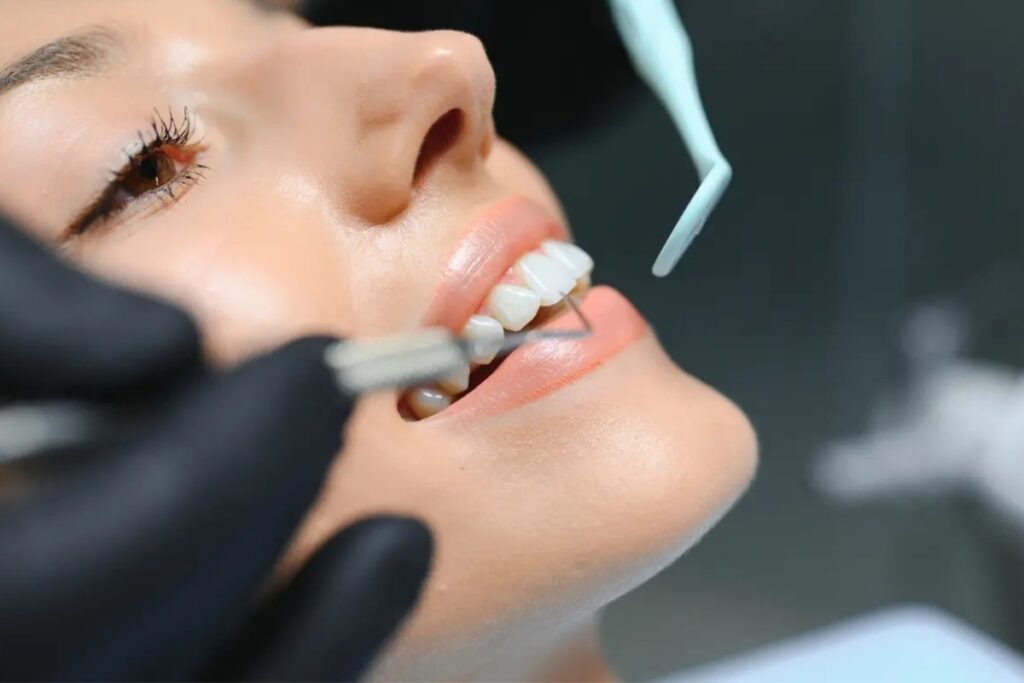
Fluoride Treatments for Stronger, Healthier Teeth
Fluoride strengthens tooth enamel through a natural process called remineralization. This process can even reverse the earliest signs of erosion and stop tooth decay.
Depending on your needs, your dentist may recommend prescription-strength toothpaste, fluoride mouthwash, or in-office fluoride treatments.
These options protect your teeth from further damage.
Dental Sealants for Hard-to-Reach Surfaces
Back teeth contain natural pits and grooves that make the chewing surface uneven. Those small spaces trap food and bacteria. When it sits there too long, cavities eventually form.
Fortunately, there’s a fix. Dental sealants protect biting surfaces. They make the tooth surface easier to clean.
It helps prevent decay from forming in these hard-to-reach surfaces.
Oral Cancer Screenings for Early Detection
Most patients won’t show signs of oral cancer, but detecting it at the earliest stage greatly improves treatment success. Dr. Salm performs a thorough oral cancer screening during your routine checkup.
Dr. Salm visually examines your mouth, face, and neck. He also gently checks for lumps, sores, or unusual color changes.
Dr. Salm and our hygienists perform these quick, painless exams with advanced training. So, you feel confident knowing your oral health stays well-monitored.
Tooth-Saving Root Canal Therapy
Root canal therapy removes infected or damaged pulp from inside your tooth. The pulp is the soft tissue at the center of the tooth that contains nerves and blood vessels.
Deep decay or injury can infect the pulp. When that happens, endodontic treatment might be the tooth’s only saving grace. More importantly, the infection can spread without this treatment.
Then, pain and damage spreads outside of the tooth root to the bone. It causes bone loss around the tooth and even extends to nearby teeth.
At that point, you can suffer tooth loss and even lose the surrounding teeth. Root canal therapy helps you avoid serious complications.
Signs You May Need a Root Canal
- Persistent toothache or pressure
- Mouth pain when chewing or touching the tooth
- Prolonged sensitivity to hot or cold
- Swollen or tender gums near the affected tooth

Guidance on Food and Drinks That Cause Dental Erosion
A healthy, balanced diet protects your teeth and gums. And what you eat or drink directly impacts your oral health.
As part of a preventive plan, your dentist may recommend avoiding acidic foods and drinks that cause dental erosion.
Foods high in acids or sugars that lead to erosion risk include:
- Acidic Drinks – Bacteria in your mouth feed on sugary food and drinks. Acidic drinks like sugary sodas produce acid-producing bacteria. Meanwhile, carbonation and added acids lower the pH in your mouth. Both demineralize and weaken tooth enamel.
- Fruit Juice – Even juices marketed as healthy like apple or orange juice contain high levels of natural sugars and acids that wear away enamel when consumed often.
- Chewing Gum – The sugar in gum, even sugar-free gum, can bathe your teeth in sugars. To prevent cavities from forming, it’s best to refrain from chewing gum.
- Citrus Fruits – Citrus fruits like lemons, oranges, and grapefruit soften and wear away tooth enamel. That’s because of the citric acid they contain, which makes them highly acidic.
- Sugary Snacks – Candy, cookies, and other sweets encourage bacterial growth and acid production. That accelerates erosion and cavity risk.
Your dentist can give you dietary guidance and tips to help lessen or avoid acid attacks on your teeth.
For instance, they may advise to avoid sugary foods or to wash your mouth out with water each time you drink sugary soft drinks.
Managing Health Conditions and Risk Factors
Certain health conditions, such as eating disorders or dry mouth, contribute to dental erosion and tooth decay.
Previous radiation therapy for head and neck cancer also leads to gum recession.
Share your health history during regular oral exams. That way, your dentist can customize preventive dental care to protect your teeth.
Satisfied Patient Reviews:

Pediatric Preventive Dental Care
Besides preventive dentistry services for adults, Smiles for Miles also offers the same preventive services for small children.
Dental issues in children develop quickly. They often can’t explain what’s bothering them. Cavities and tooth decay can have a serious impact, even for kids who don’t have permanent teeth yet.
Timely Treatment
Dentists can reverse cavities when we catch them in their very early stages. We help parents prevent pediatric dental issues in several ways:
- Wiping their baby’s teeth after bottle feeding to prevent developing tooth decay. Often called “baby bottle tooth decay”, you can prevent it this way.
- Diagnosing a painful tooth abscess in 2-year-olds that might suddenly set in.
Routine oral exams and cleanings play important roles in protecting your child’s teeth. Dentists catch these issues early and support healthy smiles as children grow.
Dr. Salm and his team focus on preventive dental services for kids by:
- Monitoring growth
- Removing plaque through teeth cleanings
- Guiding families on healthy routines at home.
These visits protect your child’s smile and set the foundation for a lifetime of good oral health.
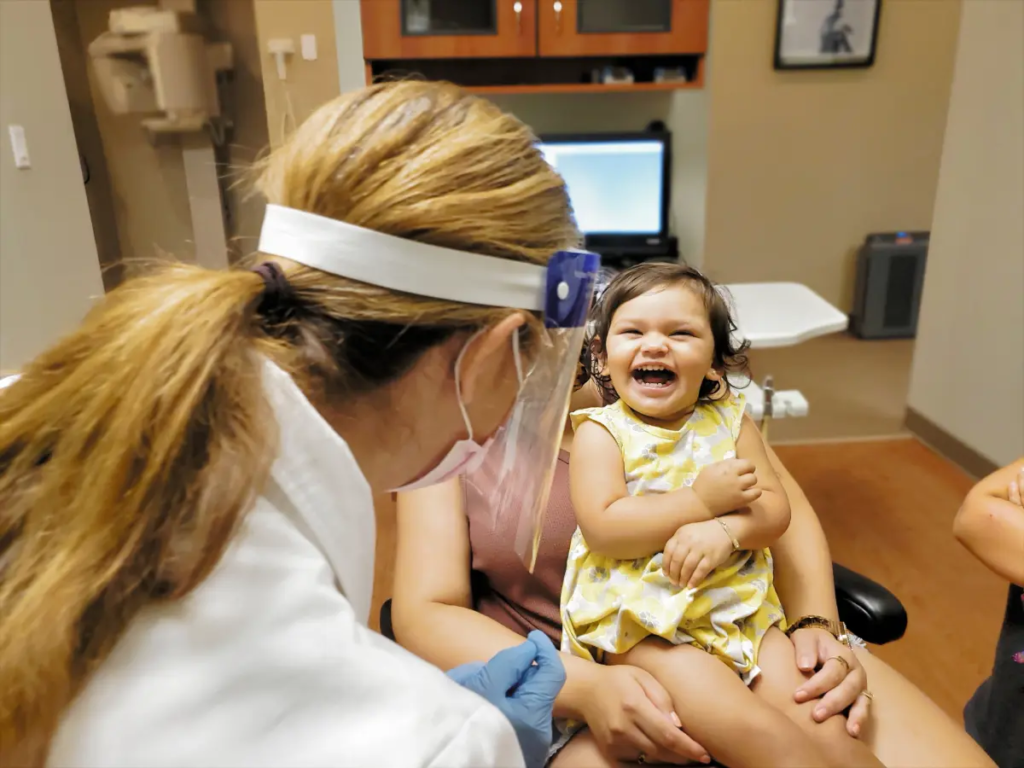
Patient Education is Key to Good Oral Hygiene
As you can see, actions like daily brushing with a fluoride-containing toothpaste and maintaining a healthy diet matter.
Scheduling regular oral exams and professional cleanings are even more important. Regular exams and cleanings forge a path to excellent dental health.
Dr. Salm firmly believes that education through regular dental visits is the foundation of prevention. When you understand your oral health, you make better decisions about your care.
Are you choosing between treatment options? Or maybe just learning how to improve your brushing technique? Either way, Dr. Salm will:
- Walk you through every step of your exam or treatment
- Offer personalized advice based on your dental history and goals
- Provide honest, pressure-free recommendations
You gain the knowledge you need to make confident choices with support from a team you can trust.
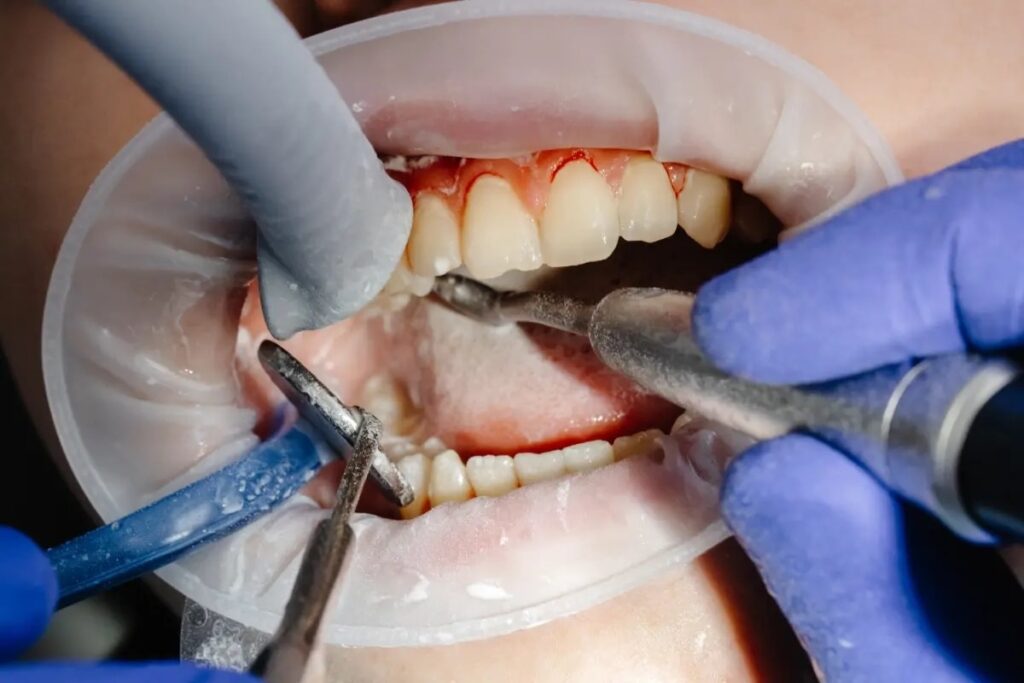
Frequently Asked Questions About Preventive Dentistry
Preventive dentistry keeps your teeth healthy by stopping problems before they form. You protect your smile through regular dental checkups, professional cleanings, fluoride treatments, sealants, and consistent home care.
With preventive dentistry services, you avoid cavities, gum disease, enamel wear, and dental pain that may appear only when a problem grows severe.
Early detection helps dentists simplify treatment and reduce long-term costs. You and your dentist work together to reduce the risk of decay, gum inflammation, infection, or tooth loss later on down the line.
Preventive care also protects your chewing comfort. It helps you maintain natural teeth into adulthood and beyond.
General dentistry treats problems like cavities, fractures, or infections that already exist. Preventive dentistry focuses on stopping these issues before they start, which makes your visits easier and often less expensive.
Cleanings, sealants, fluoride, and checkups fall under prevention, while fillings and crowns fall under treatment. Prevention gives you control instead of waiting until something goes wrong.
Preventive dental insurance often pays for checkups, cleanings, exams, and routine X-rays in full or at a reduced cost.
Many plans support fluoride as well, which strengthens enamel and lowers cavity risk. This sort of coverage encourages patients to stay consistent with care and catch early changes, rather than waiting for more costly dental work.
Schedule a visit when the first tooth appears. Early appointments let dentists monitor growth, show parents how to clean tiny teeth, and prevent baby bottle decay.
As permanent molars erupt, sealants and fluoride protect deep grooves that trap food and bacteria. Preventive visits also help children feel comfortable in the dental chair. That confidence lowers dental anxiety for years to come.
Build small habits you can stick with every day. Brush twice a day using fluoride toothpaste, floss once daily, and rinse after sugar or acid exposure.
Visit your dentist twice a year so early concerns never become emergencies, infections, or worse, expensive procedures. Prevention saves time, stress, and often your tooth structure.
Brush two times every day, for two full minutes each time, and visit your dentist twice a year for checkups.
The 2-2-2 rule creates a simple routine that fits into daily life. Yet it still offers strong protection for enamel and gums. Kids and adults benefit from this rule, making it a reliable guide for healthy smiles long term.
Fluoride strengthens tooth enamel and helps stop decay before it forms. Your teeth lose minerals every day, and fluoride replaces them to keep enamel firm and smooth.
You can get exposure to fluoride through toothpaste, mouth rinses, drinking water, or a dentist-applied treatment that gives added protection.
Most people benefit from visiting the dentist every six months. Others may need more frequent cleanings if they have gum concerns or a history of decay.
Consistent visits let your dentist remove buildup you can’t brush away. They catch small issues while they’re still simple to treat.
Dental problems often stay hidden until pain or infection sets in.
A dentist finds early signs of trouble and treats them before they grow into something bigger. Regular care protects your enamel and keeps your breath fresher. It makes chewing comfortable and worry-free.
Dentists polish teeth to remove surface stains and smooth enamel after a cleaning. Smooth teeth hold less plaque, so they stay cleaner between visits.
Plus, many people enjoy how slick and bright their teeth feel after polishing. It finishes the appointment on a high note.
A dental therapist provides basic dental care under a dentist’s guidance.
They fill cavities, offer preventive services, and support communities where regular care may be harder to access. Their work helps people receive treatment sooner instead of waiting for pain or emergencies.
A dental hygienist focuses on prevention. They clean plaque and tartar, take X-rays, apply fluoride, and watch for gum problems long before symptoms appear.
Hygienists also teach brushing and flossing techniques that fit real daily routines. This instruction builds confidence in home care.
Brush two times daily with fluoride toothpaste and floss once a day to remove plaque before it hardens.
A hygienist removes stubborn buildup during cleanings to protect your gums from swelling or bleeding. Small habits done often make the biggest difference for plaque control.
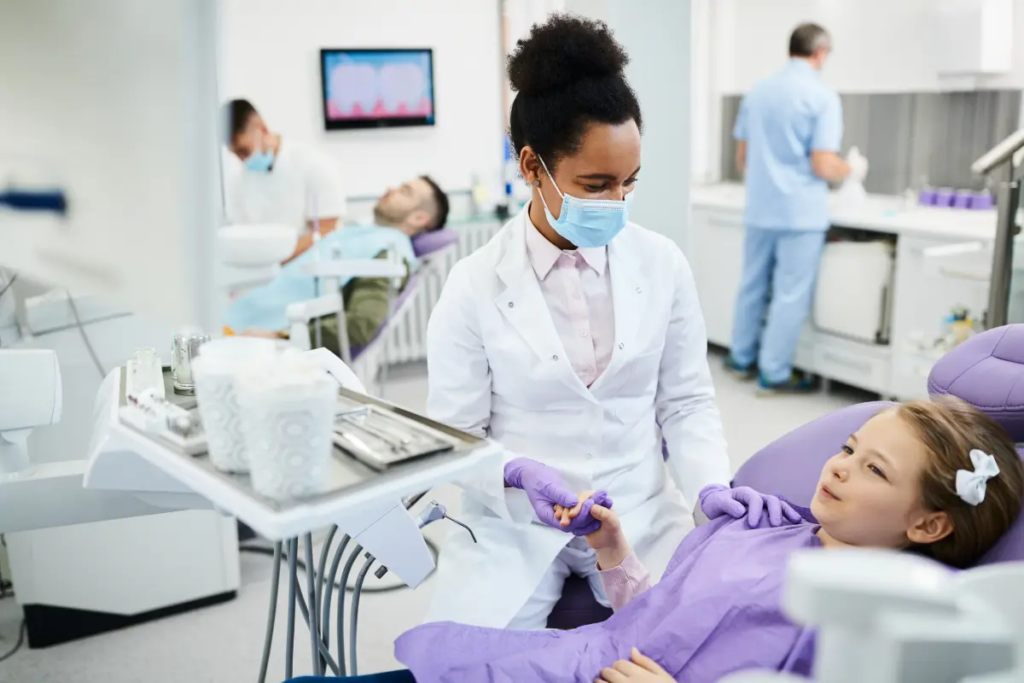
Satisfied Patient Reviews:
Start Your Preventive Care Journey Today
Dental problems often start quietly, long before pain shows up. You might not notice small pockets of plaque, early enamel wear, or gum inflammation without routine care.
Preventive dentistry stops these issues early and protects your smile with simple habits, cleanings, and regular checkups. Staying ahead of problems keeps your mouth healthier, your visits easier, and your long-term costs lower.
Protect your smile and invest in your health with expert preventive dentistry at Smiles for Miles Dentistry.
We’re here to help you avoid dental problems before they start. We aim to keep your teeth and gums in great shape for years to come.
Already experiencing a dental problem? Refer to the 5 Signs You Need to Visit a Dentist Immediately to head off emergencies.
Or call (262) 548-3555 or schedule your next checkup online. Let’s take a proactive step toward a healthier smile. And let’s do it together.
